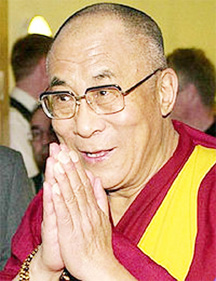WASHINGTON/BEIJING (Reuters) – China accused the United States yesterday of “grossly” interfering in its internal affairs and damaging relations after President Barack Obama met exiled Tibetan spiritual leader the Dalai Lama at the White House.

Obama met the Nobel Prize laureate for some 45 minutes, praising him for embracing non-violence while reiterating that the United States did not support independence for Tibet.
China, which accuses the Dalai Lama of being a separatist who supports the use of violence to set up an independent Tibet, said Obama’s meeting had had a “baneful” impact.
“Such an act has grossly interfered in China’s internal affairs, hurt the feelings of Chinese people and damaged the Sino-American relations,” Xinhua quoted Chinese Foreign Ministry spokesman Ma Zhaoxu as saying in a written statement.
“We demand the US side to seriously consider China’s stance, immediately adopt measures to wipe out the baneful impact, stop interfering in China’s internal affairs and cease to connive and support anti-China separatist forces that seek ‘Tibet independence’,” Ma said in the statement.
The Dalai Lama denies China’s accusations, saying he wants a peaceful transition to autonomy for the remote Himalayan region, which China has ruled with an iron fist since 1950, when Chinese troops marched in.
The White House said in a statement that the Dalai Lama told Obama he was not seeking independence for Tibet and hoped that “dialogue between his representatives and the Chinese government can soon resume.”
Obama’s meeting came at an extra sensitive moment for China, the United States’ biggest creditor, with leaders in Washington at odds over how to raise the $14.3 trillion US debt ceiling in time to avoid default.
China holds more than $1 trillion in US Treasury debt and would be particularly exposed should Congress fail to reach a deal by Aug. 2. A US default could rocket up interest rates, sink the value of the US dollar and hurt the global economy.
Obama stressed the “importance he attaches to building a US-China cooperative partnership,” the White House said.
“The president reiterated his strong support for the preservation of the unique religious, cultural and linguistic traditions of Tibet and the Tibetan people throughout the world,” White House spokesman Jay Carney said in a statement after the meeting.
“He underscored the importance of the protection of human rights of Tibetans in China. The president commended the Dalai Lama’s commitment to nonviolence and dialogue with China.”
Obama also said he encouraged “direct dialogue to resolve long-standing differences, and that a dialogue that produces results would be positive for China and Tibetans.”
China, which reacts angrily whenever foreign officials meet with the Dalai Lama, said Vice Foreign Minister Cui had “urgently summoned” Robert S. Wang, Charge d’Affaires at the US Embassy in Beijing to lodge China’s objections, according to a statement on its foreign affairs ministry website.
“China expresses its strong indignation and resolute opposition,” the statement said. “Tibet is an inseparable part of China and Tibetan issues are purely an internal matter for China.
The Dalai Lama, who has met with various US leaders during his stay in Washington, said he felt a “spirit of reunion” with Obama, said Kate Saunders, a spokeswoman for the Washington-based International Campaign for Tibet.
“(Obama) is naturally showing some concern for basic human values, human rights, religious freedom,” the Dalai Lama said after the meeting, according to Saunders. “Naturally, he shows genuine concern about the suffering in Tibet and also other places,” she quoted the Dalai Lama as saying.
Beijing warned the United States to stay out of its affairs last week after top lawmakers including House of Representatives Speaker John Boehner, the top Republican in Congress, and top House Democrat Nancy Pelosi met the Dalai Lama ealier in his visit to Washington.
Obama’s meeting with the Tibetan spiritual leader was his first in more than a year.
